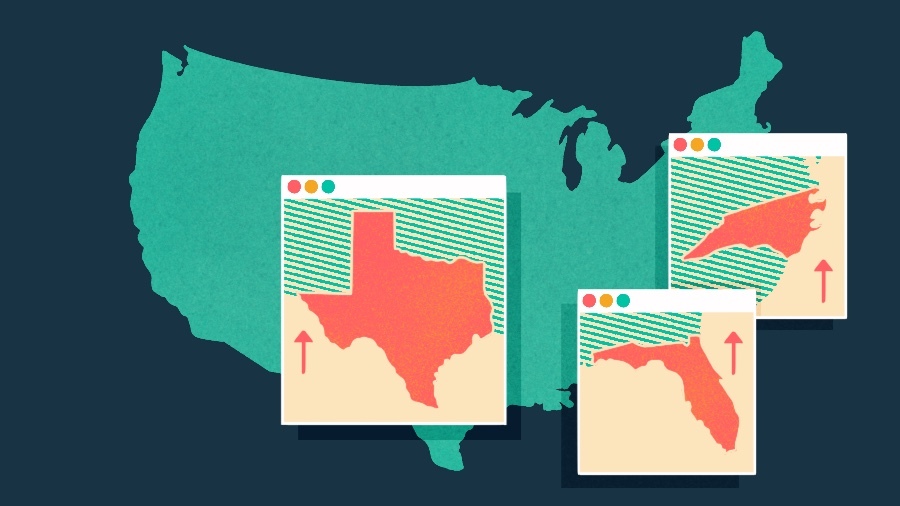Last year could not top the banner year venture capital saw in 2021 — at least in most geographies.
While the holy trinity of venture funding — California, New York and Massachusetts — saw massive declines (we’ll get to that tomorrow) some states actually realized significant gains last year, according to Crunchbase data.
“It doesn’t surprise me,” said Steve Case, founder of Washington, D.C.-based venture firm Revolution, which focuses on investing outside of the major hubs of Silicon Valley, New York and Boston.
Search less. Close more.
Grow your revenue with all-in-one prospecting solutions powered by the leader in private-company data.
“A lot of these areas laid the groundwork years ago and are seeing the payoff,” he said.
While the big three saw big declines in venture investment between 2021 and 2022 — although still more than they saw in 2020 — states such as Florida and North Carolina saw substantial gains. Texas venture funding numbers remained even with 2021 levels to the state after seeing a significant increase in 2021 — still impressive since most areas saw a decline last year.
Case said while there has been steady progress in making the geographical dispersal of venture capital more diverse, the COVID pandemic and the movement of talent has likely accelerated that trend.
Along with that, new government initiatives around sectors such as semiconductors and infrastructure and certain areas having an advantage in specific sectors tech has moved into — such as health care and foodtech — also have helped level the playing field.
The Sunshine State
No state was able to take advantage of those trends more than Florida. The Sunshine State saw the biggest percentage increase of any state in venture capital investment between 2021 and last year.
In 2021, investors spent $7.8 billion on Florida-based startups over the course of 652 deals, according to Crunchbase. Last year, that venture number jumped 25% to $9.7 billion in 601 deals. In 2020, Florida startups only took in $3.4 billion in 470 deals.
“Even us, as Florida’s biggest cheerleaders, we could not imagine what has happened,” said Saxon Baum, partner at Florida Funders, an investment firm that focuses on Florida and the Southeast and has 96 portfolio companies.
Florida saw several large funding rounds last year into the likes of Fanatics, Citadel Securities and Yuga Labs. Industries including crypto, space, gaming and cybersecurity have started to thrive in the state.
While the Florida startup scene has been bolstered by the lack of state income tax and a host of successful exits including KnowBe4, ConnectWise and Reef in recent years, it also is likely the state received the biggest boost from COVID migration.
During the pandemic, Florida remained much more open than parts of California and New York.
“People moved here, money moved here,” said Baum, pointing out the state has the third-highest number of accredited investors behind only California and New York.
Baum also points out that many see Florida as a natural entry point to the growing Latin American market, also making it an attractive location.
With the increase in venture, Baum added he has already seen big names move into the market in the past few years. “We see Sequoia, Andreessen, SoftBank, etc.,” he said. “We never really saw those names until recently.”
While those firms have added to the competition on deals to some extent, it also has given more opportunities to work together.
“Yes, it’s added competition, but also they want and need to collaborate,” he added.
The Tar Heel State
Although Florida saw the biggest venture capital gains in 2022 — a come-back-to-reality year for the industry — it was not the only state to see a significant uptick.
Just up the road, North Carolina also powered through what was a down year for most areas. The Tar Heel State saw nearly a $1 billion increase in venture capital going to the startups in its borders.
The numbers were helped out immensely by Epic Games’ massive $2 billion investment from Sony and KIRKBI that valued the gaming company at $31.5 billion.
Lister Delgado, founder and managing partner at IDEA Fund Partners in Raleigh, said he has noticed real growth in the tech and startup ecosystem in the state — and it is not just due to the effects of COVID.
“Clearly there has been a shift,” Delgado said. “People moved here and you can just look at the dealflow.”
Unlike some regions that are seeing a relatively young tech scene prosper, Delgado points out that North Carolina has been sustainably growing its startup scene for decades, from research and biotech out of the Research Triangle to the successes of Epic Games and open-source software giant Red Hat.
North Carolina’s numbers are definitely moving in a positive direction. Startups in the state received about $3.5 billion in venture capital via 241 deals in 2020. Those numbers grew to $4 billion via 285 deals in 2021.
However, the state saw an even bigger jump — 24% — last year while most other regions posted declines. North Carolina startups, meanwhile, saw $4.9 billion roll to them in 234 deals.
Delgado said he already is seeing more out-of-state money come into the state — and just like Florida, he is seeing bigger names including Tiger Global, Bessemer Venture Partners and Battery Ventures being more active.
Tiger, for example, took part in Raleigh-based analytics firm Pendo’s $150 million Series F in 2021.
Enterprise software, deep tech, AI and fintech all provide substantial growth areas for North Carolina, Delgado said.
“It’s very diverse,” Delgado added. “Just the diversity of focus [of startups] is incredible.”
The Lone Star State
Sometimes in a year that doesn’t live up to its predecessor, it’s not just the areas that make gains that count. It’s also important to note the ones that held steady and did not give back previous massive jumps.
Texas fits that bill exactly. Venture funding to startups in the Lone Star State jumped 105% between 2020 and 2021 — from $5 billion to $10.3 billion — per Crunchbase data. Last year, Texas startups saw about the same — actually, a little 1% uptick — which is especially notable since Texas’ venture economy trails only that of the big three states.
“It was an interesting year here,” said Morgan Flager, managing partner at Austin-based Silverton Partners, which has more than $500 million under management. “It was kind of a year of two halves. The first half was definitely a carry-over from 2021.
“The second half softened,” he added.
Not surprisingly, the two biggest rounds — Securonix raising $1 billion and Elon Musk’s The Boring Company landing $675 million — both happened in the first half of last year.
While Texas has welcomed its share of big tech companies in recent years including Hewlett Packard Enterprise and Oracle, Flager said the tech ecosystem can still continue to grow in the state — although perhaps not at the same pace places like Austin have grown in recent years thanks in part to COVID and other cultural shifts.
Health care IT, fintech and enterprise software are all leading upward-trending growth, along with a significant influx of talent over the years.
“I don’t feel like we’ll take a step back,” he said. “There are too many tailwinds. But it will be interesting to see what happens to the pace.
“A place like Austin cannot continue to have increases in its population like what happened in 2021,” Flager added. “But it’ll still grow.”
Illustration: Dom Guzman

Stay up to date with recent funding rounds, acquisitions, and more with the Crunchbase Daily.



![Illustration of remote meet on cellphone, unicorn chess piece and money. [Dom Guzman]](https://news.crunchbase.com/wp-content/uploads/business-strategy-470x352.jpg)







67.1K Followers